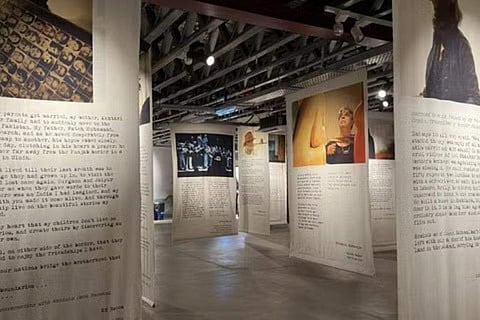
- LIFESTYLE
- FASHION
- FOOD
- ENTERTAINMENT
- EVENTS
- CULTURE
- VIDEOS
- WEB STORIES
- GALLERIES
- GADGETS
- CAR & BIKE
- SOCIETY
- TRAVEL
- NORTH EAST
- INDULGE CONNECT

An advanced camera is an absolute essential these days while purchasing a phone. The front lawn of Museo Camera Centre for Photographic Arts in Gurugram has some props that are sure to whip these cameras out. Aditya Arya, the owner of the art gallery, says, “Museo Camera celebrates art and culture in various genres.” Currently on display is Manisha Gera Baswani’s ‘Postcards from Home’, a collection of 47 postcards of artists from India and Pakistan.
Born to parents of pre-Partition India (Sargodha and Quetta) Baswani’s childhood was filled with stories of Pakistan, which she considers a “home away from home.” It was by chance that she found that many, on both sides of the border, have grown up listening to similar stories of their ‘homes’ that had to be abandoned after Partition.
Each contributor to the exhibition, many of them artists, has a personal link to this historic event. In some cases, they are indirectly through family. Each postcard carries their picture, and the reverse narrates their story, that they have directly experienced or heard from their parents and grandparents. Displayed at the Lahore Biennale in 2017 and the Ashmolean Museum, Oxford from 2022 to 2023, ‘Postcards…’ is being showcased at Museo Camera till August 8.
Excerpts of the conversation with Baswani about her experiences across the border and the birth of the idea of the exhibition:
How long did it take you to visualise and set up the exhibition?
I am a painter but since 2001, I have been photographing Indian artists in their studios, as part of a project, ‘Artists through the Lens’. In 2015, I went to Pakistan for a solo show of my paintings. I told my Pakistani friends, two of them whom I had known earlier, to take me to artists’ studios. I heard stories from many senior artists, and younger artists as well, whose parents were born in India, about how they miss their home. That’s when the penny dropped—the stories are the same from this side of the border too. The bedtime stories we have grown up on are the same on the other side. The same love, emotion and desire to be home. I came back and I said, I have to bring these stories together.
I connected with those artists who have Sindhi and Punjabi surnames, asking them if they have any connection with Partition. And I was bombarded with stories and photographs. Of the 47 postcards, 25 are from India and 22 from Pakistan.
What are the tales of Partition that you have heard from your parents?
My dad is 92. My mother is 84.She was 8 and he was 14, when they came [to India]. Of course, they lost everything and they suffered. But the only emotion I feel and hear from them is love and gratitude and I felt the same emotion on the other side. There was no remorse, no bitterness. That’s when I felt I have to bring this project of the love for home to the world, to show that there are no borders in love or the memory of home.
This project makes you remember either your parents or their beautiful memories. A big idea behind Postcards… was that the next generation understands what it is like to lose everything, that it happened equally for both sides of the border and still not bear animosity. The world is witnessing migration on a huge scale, I want to show how migrants and refugees have added to the city. My parents added to Delhi and likewise people who went from Delhi or India to Pakistan, did so.
I think that this project is like a little baby, it keeps growing and it teaches me more with each viewing. My mother uses a very beautiful phrase,“Yeh project aap ko khuda ne karwaya hai” (God made you do this project) and it is finding its own life. ‘Postcards…’ is a project which was made by me, but it has now found its own journey. I’m merely the tool which is aiding it.
Were there other stories that you found that you could not include in the exhibition?
Definitely. At the Lahore Biennale, people would come up to ask, “Are you Manisha from India?” and then suddenly, they would start talking of the time when they left India or their parents did. I’ve cried with strangers, hugged them and never met them again.
The nimbu paaniwala at the Shahi Hamam where I was exhibiting at the Biennale realised after three days that I’m from India. He came back with around Rs. 300 to 400 saying,“How can I take money from you? You are my sister from India. I didn’t know that you’re from India. Otherwise, I would have given you the lemonade you have drank the last few days for free.”
Are you planning a follow-up to ‘Postcard from Home’?
I really don’t know. I do have a few extra stories—and stories from both Pakistani and Indian artists keep adding to the initial list of 47.
Since I always work with my heart, I know something will come out of it.